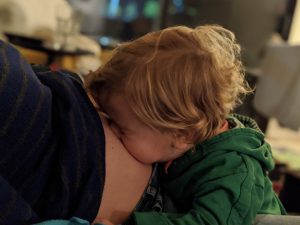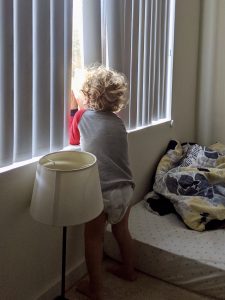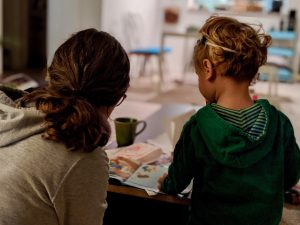I can’t remember when I found out that the postpartum period was a thing. For those of you that haven’t spent the last many months researching things related to pregnancy and baby, the postpartum period just refers to a period of time after birthing a baby, usually around six weeks. This stretch of time has a specific name because it is characterized by things being different than normal in the mother’s body and mind.
When you grow a baby, your body goes though a lot of changes. These things then have to change back again (as much ‘back’ as they will ever get anyway) after the baby is born. Obviously, the belly will become smaller, but that’s really just the beginning. Almost immediately after birth, the uterus (which grew from being the size of a pear to the size of a watermelon during the pregnancy) begins to shrink. And as you may imagine, all the organs that were pushed out of the way to make room for this now need to return to their original places again. And where the placenta was attached to the uterine wall, there is now a wound, which is going to be bleeding for weeks (hello 5-week long ‘period’. If you’ve ever had a yeast infection, you’ll shudder like I did at the thought of wearing maxipads for weeks).
And then of course there’s your entire pelvic region, which is likely to be a bit out of shape from having a baby wedged in there for several months, and then have that same baby pass through it. There’s a good change your bladder is weakened, and the vagina and perineum may have tears. In addition there are, of course, the hormones. Oh, are there hormones. All the hormones that were needed to sustain the pregnancy are so no longer, so after birthing the baby, your levels pretty much crash to what I heard described somewhere as ‘menopause levels’.
This seems like an overwhelming amount of changes to one person’s body. And then you have to factor in that you’ve also just become somebody’s mother and now have an infant to keep alive (read anxiety, learning to breastfeed, sleep deprivation and potential postpartum depression).
But despite this, there is very little information given to women about the postpartum time, and very little support is offered by the health system. In my case, and the case of most new mothers in the US, the first checkup after being discharged from the hospital is after 6 weeks. This seems crazy given that just before you birthed the baby, you we’re bring seen by health care professionals once a week. But in the postpartum period you are left mostly to your own devices, with a few instructions by hospital staff which you try to retain in your fuzzy brain, such as no sex for 6 weeks and don’t lift anything heavier than the baby. I wonder, by the way, how many mothers in the US (are able to) abide by that latter one, given that most partners get little to no parental leave. If you’re alone with the baby during the day, you basically can’t go anywhere during those six weeks, because you are not allowed to lift the carseat, and very few things are within walking distance, at least in many parts of the country.
Because I did obsessive research about pregnancy and birth even before I got pregnant I was often a step ahead of my own progress. So by the time I was a few weeks away from delivering, I had finished researching birth and thus ended up interested in this postpartum thing I’d encountered here and there on the internet. I had obviously realized that we would be tired after the baby was born, and I had tried to make sure we’d be well nourished anyway by cooking about a million freezer meals.
[easy-image-collage id=2323]
Making pasta and lasagna as postpartum freezer meals
But, I really had not thought much about what would happen to ME after the birth. And here is where it’s weird that we don’t talk more about the postpartum period – because I bet that most women who have been through childbirth now know a thing or two about it that they wish they had known beforehand. Of course, there are all the horror stories about the immediate postpartum, like how much peeing hurt, and how bad the first poop was. But we don’t really talk about the long-term healing process, what it’s like, and what we can do to encourage it. And many women have experienced things in their postpartum that didn’t end well. Although women’s bodies were designed for gestating and birthing babies, it doesn’t mean (however much the celebrity community wants us to believe it) that things always go smoothly or that the body just bounces back to its pre-pregnant state. In fact, a large proportion of women experience significant weakening of the pelvic floor after birth, which can lead to incontinence, diminished sexual pleasure, trouble climaxing, and in extreme cases even uterine prolapse, which is a fancy way of saying that your uterus is attempting to exit your body though the vagina. It seems like one of those situation where the medical community has agreed that this is just how it is that we just need to accept a certain amount of damage to our bodies as the price of having babies. And while I’m sure most women who want children would accept paying such a price, I’d guess that there are un- or under-explored avenues that could help new mothers recover better than they currently are.
I had stumbled upon an alternative (for lack of a better word) podcast about women and birth (from which I’ve taken some information to heart and discarded things that did not resonate with me), and they happened to do an episode on the postpartum period, which I found informative (the Indie Birth blog also contains this post, which I very accurately describes many of the feelings I had about my postpartum period).
The primary point that I took away from this was their 5-5-5 principle. This says that during your postpartum period you need to be strict about giving yourself time to heal and rest. You do this by staying in bed for five days after birth, staying on the bed for the next five days, and then finally staying around the bed for another five days. This means that you spend your first days mostly lying down in bed with the baby, and that you consequently have other people bring you what you need. Next, you might sit up in bed and perhaps accomplish a few things from there, but you still spend your time mostly on or in the bed. And finally, you spend the last five days in the house, standing up sometimes and maybe doing a few tasks or chores, but you are still getting plenty of rest in the bed. Although I did not strictly follow this principle, I tried to keep to it in spirit, meaning that I was mostly horizontal for the first 5 days, sometimes on the bed, sometimes on the couch. I didn’t walk anywhere and I left the chores to Paulus and my mom. For the next five days, I was mostly in the house, but I was upright more, and we went outside once or twice. The final five days, I started doing a few chores, we left the house twice to visit our family and friends, and I think I even went for a walk once. After this, I felt ok to sit up more, to do some work, and I’ve been aiming for a daily walk.
So far, my physical healing has gone really well. I was surprised to see how rapidly my belly got smaller, pretty much immediately. The first couple of days after birth, I still looked maybe 4 or 5 months pregnant. After about a week, I still had a bit of a poochy belly, but with my clothes on, I looked almost back to normal. Two weeks after the birth, only the skin around my belly button remained a bit looser than before, and now, four weeks later, the linea nigra is pretty much the only visible remnant of the baby belly. My abdominal muscles still have some work to do to get a bit closer together, but I have lost all the weight I gained during the pregnancy (this despite the generous amounts of chocolate I have consumed and the (intentional) almost complete lack of exercise, so I guess I have to say thank you breastfeeding) My stitches have healed well, and I got the all clear at my 6-week postpartum check-up with the midwives. So I guess I was one of the lucky ones, who could afford to take time off after birth, and whose bodily shapes cope well with the changes of pregnancy and birth.
Apart from the bodily changes, though, there have been several hormonal ones. For one, I seem to be getting hot flashes every time I nurse. This is just a minor nuisance. The wild emotions, on the other hand, have been difficult to deal with and they took me totally by surprise. I cried a lot during the first four weeks postpartum.
Picture this: some two weeks postpartum, there’s a knock on our door, and two cars worth of relatives pour into our apartment unannounced (perhaps it wasn’t precisely unannounced, but that’s how it felt). While they are all well-intentioned and immediately ask what they can do, they are all eager to see the baby, hold him, and capture this special time on photos. It’s a bit much for me, so I retreat to the kitchen and end up doing some dishes that we had left there, just to avoid feeling totally out of place. Of course, this is about the stupidest thing to do, as it leaves me feeling resentful that all these people are crowding my house and holding my baby, while I’m doing the work they were supposed to be here to help out with. And because I’m tired and still in the middle of an extreme hormone shift, I can’t hold back tears. I just start crying. When my mom sees this, she moves to come comfort me, but I just know that her embrace will ensure that I lose it completely, and so I tell her to please don’t hug me right now. Except it comes out as almost a shout, angry and rude. And at this point, we have to ask everyone to leave, so I can cry in peace and hold my baby, who happily seems unaffected by it all.
So yeah, I cried out of frustration and exhaustion. But I’ve also cried a lot out of love and happiness. I cried when all of Paulus’ family got together to sing a song over Skype that they had made for Storm, and I cried when we received especially thoughtful gifts and family baby-heirlooms, and when I thought about all the love everyone was showing us. But more often than not, the crying was brought on by something silly. There was that time when I was dressing Storm, and I was talking him through the process. ‘Ok, now I’m gonna bend your elbow so we can get your arm through this sleeve. Ooh, good job, and now let’s do the other one’. When I got to the part about putting a sock on his little foot, I suddenly remembered the animated cartoon about Little Foot the Dinosaur, and I started to tell Storm about this, because that is a great story, and he should know it. But approximately two sentences in, I got to the part where Little Foot and the other baby dinosaurs get separated from their parents and have to make it through the dangerous world alone in order to get back to them. At that point, I just lost it and started crying, because what if it were Storm who got separated from Paulus and me! Yeah..
I’ve also had to stop singing the Danish nursery rhyme about Lille Sky, ‘Little Cloud’, because it makes me cry. It’s about a baby cloud who, during its morning walk accidentally pees rain on a road, despite parental admonitions not to, and when it arrives home it gets scolded a little bit, but also has a diaper change. I don’t know, something about that song just makes me choke up every time.
All in all, the first few weeks after Storm were an emotional time, and I needed a lot of space to recover my equilibrium. We learned that we needed to limit the number of guest in our house at any given time, despite all of our family members being here. A bit later we learned that I do better when we take a ‘rest day’ every once in a while, where we don’t go out and we don’t see anybody. I found it really difficult to balance the desire to engage with family that we hadn’t seen for so long and who had traveled so far to be with us with what we needed as new parents. We managed to ask our family to bring groceries for us a number of times, and to cook or bring the meals we were sharing with them; my mom did the laundry a time or two, and all the grandparents were very helpful in helping us put Storm to sleep. But asking them to help us with household chores, so that we could rest and focus on the baby, turned out to feel too weird – when your family has traveled 9000 kilometers to visit you, it seems so odd to ask them to clean the kitchen for you while you disappear with the baby, and in most cases I ended up thinking that the kitchen wasn’t dirty enough to warrant this kind of request. I suppose this is all part of navigating life far from your family and the friends you grew up with, and hopefully we’ll get better at it as time goes by.





